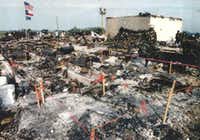Twenty-five years ago Wednesday, 76 agents of the federal
Bureau of Alcohol, Tobacco and Firearms raided the Branch Davidians'
property near Waco to arrest their leader, David Koresh, and search for
evidence that the sect was making and stockpiling illegal machine guns,
grenades and other armaments. A shootout touched off a 51-day
siege.
This is how it unfolded:
Feb. 28, 1993
Less than an hour before ATF's raid, the sect is tipped off by a TV cameraman. Not realizing a man in a postal vehicle is a Davidian, the cameraman tells him that the ATF is about to launch a raid. David Jones rushes back and tells Koresh, and the sect has 45 minutes to prepare. A firefight begins as agents arrive at the compound in cattle trailers. Four agents die; 17 are wounded. By day's end, six Davidians are dead and Koresh and several other followers are wounded.
That night, the FBI's Hostage Rescue team and negotiators arrive in Waco.
The ATF agent who negotiates a cease-fire persuades
Koresh to release two children each time Dallas radio news station KRLD
plays Koresh's message that God had given him the ability to unlock the
seven seals of Revelation and start the apocalypse.
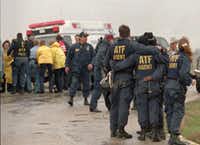
March 1
The FBI takes charge of resolving the standoff. The FBI's
hostage rescue team tightens the perimeter around the compound. Koresh
declares, "If they want to fight, we'll fight."
The FBI restricts compound phone lines to negotiator calls. Koresh demands the phones be restored or FBI officials will have to live with knowing "they're the one that killed these little children."
A negotiator offers to give Koresh a national platform for a recorded message if he agrees to lead his people out after the message airs. Koresh agrees.
March 2
At 1:30 p.m. Koresh's 57-minute recorded message is aired on the Christian Broadcasting Network. (Koresh had promised to surrender after the broadcast.)
Hours later, Koresh's lieutenant, Steve Schneider, tells negotiators that God has told Koresh to wait. Furious, the FBI's tactical and on-scene commanders move tanks forward. Negotiators urge patience.
March 5
A 9-year-old girl is the last of 21 children to come out.
FBI profilers warn in a memo that increasing tactical pressure "could eventually be counterproductive and could result in loss of life."

March 7
Koresh tells a negotiator he's Christ come to judge the world, starting with overthrowing America.
Asked to send more kids out, Koresh responded: "You're dealing with my biological children now." All of his children would die in the compound.
McLennan County Sheriff Jack Harwell phones Koresh and says he'd ask the FBI to send milk into the compound.
After milk is sent in, Koresh sends out a videotape of himself and some of his wives and children. Some observe it would be positive public relations for Koresh and FBI officials don't release the tape.
March 9
Without consulting negotiators, FBI commanders temporarily cut off compound electricity.
Davidians hang a banner: "God help us, we want the press."
March 11
FBI tactical commanders ask for Washington's OK to use tear gas to pressure Davidians to surrender. The proposal is denied.
March 12
Janet Reno is sworn in as U.S. attorney general.
A Davidian who surrenders tells the FBI that Koresh has "total hold" on followers and many would surrender "if David would tell them."
The FBI permanently cuts electricity and begin shining spotlights on the compound and broadcasting from loudspeakers. A negotiation leader later says cutting power was one of the "absolutely critical decisions that changed the outcome." If not for that, he said, more people would've come out.
March 13
Negotiators have difficulty reaching compound residents all day. An FBI bug picks up Koresh raging about cut power and phones. “Someone stabbing me in the back — gonna go up and blow their heads off,” he says.
March 14

People inside the compound lowered a banner outside a window on March 14, 1993, that read, "FBI Broke Negotiation" We Want Press."
A child psychiatrist tells the FBI that older children
who have been released act as if they had "a shared group secret." Major
themes with all of the children are "a sense of unusual sexual
practices involving the young girls and the sense that there is going to
be an absolute explosive end to these children's families."
March 15
Davidians Schneider and Wayne Martin meet outside the compound with Sheriff Harwell and FBI negotiator Byron Sage.
FBI bugs pick up Koresh and Schneider discussing the ATF gunfight, describing Davidians firing through windows and walls. Koresh laughs about seeing an ATF agent "in the corner all slumped," and his "head blew up."
"He shouldn't have been standing in my door. ... Trying to come in. . . . But . . . what am I goin' to do? Let 'em come in?"
March 17
A wounded ATF agent sues, alleging Waco media tipped the Davidians to ATF's raid.
Schneider refuses to come out for a second meeting, saying Koresh is angry about armored vehicles nearing the compound and ATF's media statements about their raid. Koresh declares: "We're saying your commanders are a threat. You're trying to push aside where we're coming from. Therefore, we can't communicate. ... I'm willing to give and take. I made the first move by sending out the kids. You have continued to digress on the things you promise. You keep yourselves in ignorance. You don't understand." The negotiator responds: "I do understand. We're running out of patience."
Schneider tells a negotiator that 20 to 30 people were almost ready to surrender before electricity was permanently cut. "These commanders, I mean they're the ones that have messed it up. ... I think you will tell me the truth. But they're ultimately in control."
March 21
Hours after seven adults surrender, FBI tanks bulldoze sect cars. The chief negotiator warns that the FBI is again answering positive Davidian actions with "aggressive, negative" reactions. That night, FBI loudspeakers blast Tibetan monk chants at the compound. They later play Christmas carols, Nancy Sinatra's "These Boots are Made for Walking," and dying rabbit screams.
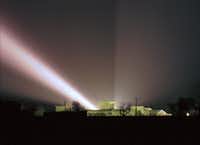
March 22
A negotiators' memo to FBI headquarters
endorses a tear gas plan. Negotiators say they hope to persuade FBI
leaders to gas the building gradually and not just throw it in.
March 23
Assistant U.S. Attorney Bill Johnston writes Reno to complain that the FBI is destroying evidence and jeopardizing any criminal case.
Livingston Fagan, a British national, is the last of fourteen adults to surrender.
March 29
After Koresh speaks to negotiators for
the first time in four days, Houston criminal defense attorney Dick
DeGuerin goes to the compound to meet Koresh. Hired by Koresh's mother,
he will return four more times and will be accompanied on his last two
trips by Houston criminal defense attorney Jack Zimmerman, who is
retained to represent Schneider.
March 30
Army veteran Tim McVeigh — the future Oklahoma City bomber — visits Waco. While there, he tells a journalism student that the incident is the start of government repression. McVeigh sells bumper stickers such as "Fear the Government that Fears Your Gun."
April 4
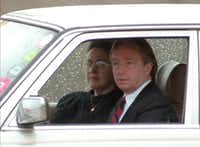
After their last meeting with Koresh, lawyers DeGuerin
and Zimmerman tell the FBI that everyone will surrender after a weeklong
Passover observance.
April 5
The Branch Davidians began observing Passover.
In a phone message to FBI headquarters, Waco tactical commanders say they won't try to fight fires that break out if there is a gas assault.
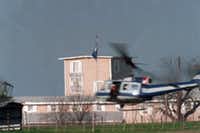
April 9
Koresh sends out a letter signed "Yahweh Koresh," which warns of coming earthquakes, disasters and judgment.
April 10
FBI agents ring the compound with concertina wire.
A second letter signed Yahweh Koresh — Koresh's name for God — warns, "do not hurt My Lamb."
April 12
FBI leaders ask Reno to approve a gas assault. She asks "why now; why not wait?" and requests more information.
April 14
Koresh tells lawyer DeGuerin
that he will come out after writing his message about the seven seals.
FBI officials dismiss that as another ruse.
April 15
In a memo to U.S. Treasury Secretary Lloyd Bentsen, whose agency oversees the ATF, Deputy Secretary Robert Altman reports that the FBI is pushing a gas assault plan because negotiations are stalled and "they don't believe it is worth waiting." Altman expresses doubts that Reno would approve the plan, concluding: "The risks of a tragedy are there. And, if the FBI waits indefinitely, Mr. Koresh eventually will concede."
April 16
Reno vetoes the FBI's plan but then requests an FBI briefing book justifying the use of tear gas.
April 17
Reno approves the FBI's tear gas plan.
FBI bugs capture talk of keeping fire trucks away. "Nobody comes in here," someone says. "They couldn't even bring in the firetruck," Schneider replies, "'cause they couldn't even get near us."
Asked about progress on Koresh's manuscript, Schneider tells a negotiator he hasn't seen anything.
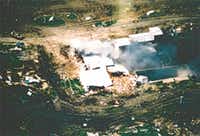
April 18
As tanks bash a vintage El Camino and Koresh's Camaro, Koresh warns a negotiator, "You're going to place this day in the history books as one of the saddest days in the world." He says they're destroying evidence and covering up for ATF "doing wrong before God, before man." A negotiator tells Koresh he seems to have no concern for anyone but himself.
FBI bugs pick up a Davidian asking "what's the latest?" Schneider says: "It may be scary." A man quips: "You always wanted to be a charcoal briquette." Someone responds, "There's nothing like a good fire to bring us to the earth." Schneider says he looked forward to what he'd do to federal agents as the prophecies were fulfilled, adding, "wait till I get my scrawny hands on your scrawny neck. I'm coming back, and when I do you aren't going to know where you're going to be able to hide."
The chief negotiator warns the hostage rescue team commander that the gas plan won't work. He later says, "I didn't think it would drive the Davidians from the building, and I was afraid it would put us in an untenable position where they were moving forward that we couldn't retreat from."
April 19
At dawn, FBI tanks begin ramming the building and spraying in tear gas. The bureau escalates gassing instead of following a gradual insertion plan because FBI snipers report seeing gunfire from the compound. Minutes after gassing begins, FBI bugs intercept Davidians discussing spreading fuel on Koresh's orders. Just before noon, FBI bugs capture talk about starting fires. At 12:07 p.m., the compound begins burning in at least three places. Fire survivor Graeme Craddock testifies he heard a fellow sect member yell "light the fire" and saw someone pouring fuel on hay bales in the chapel. More than 70 Davidians die, including at least 17 children. Koresh, Schneider and others die of close-range gunshots. Nine adults survive, including one who brought out a computer disk with Koresh's unfinished 28-page manuscript.
Staff writer Claire Cardona contributed to this report.
